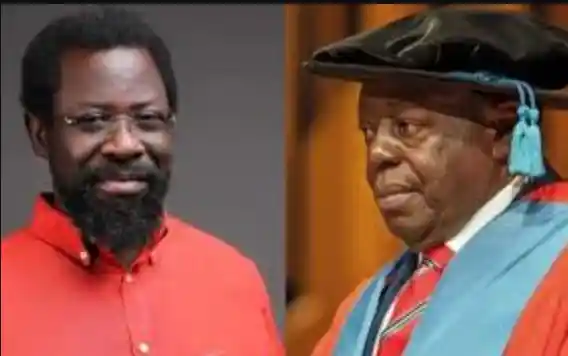Details Emerge as Court Dismisses Afe Babalola’s Defamation Suit Against Dele Farotimi
- Advertisement -
The Federal High Court in Ado-Ekiti has dismissed the defamation suit filed against activist and lawyer, Dele Farotimi, after the prosecution formally withdrew the charges. The case was struck out on Wednesday following the intervention of Ooni of Ife, Oba Adeyeye Ogunwusi, and other Yoruba monarchs, who urged reconciliation between both parties.
Prosecution Withdraws Case
During the court session, the prosecutor, Samson Osobu, informed the court that a notice of discontinuance had been filed in line with Section 108(1)(2)(a) of the Administration of Criminal Justice Act 2015. He explained that the nominal complainant, Afe Babalola (SAN), had decided to drop the case.
Also Read : Governor Dapo Abiodun Bans Sharia Court in Ogun, Declares It Illegal
- Advertisement -
“The nominal complainant has expressed his desire to discontinue the case,” Osobu told the court, praying that the charge be struck out.
The defence counsel, Olumide Fusika (SAN), did not oppose the withdrawal, stating, “We are not opposed to the discontinuation of the charge.”
With no further objections, Justice Babs Kuewumi officially struck out the case, bringing the legal proceedings to an end.
- Advertisement -
How to Apply for FCSC Recruitment: A Step-by-Step Guide
Royal Intervention Leads to Settlement
The decision to withdraw the lawsuit came just days after Afe Babalola announced that he had forgiven Dele Farotimi and would no longer pursue the case in court. His decision followed the appeal of Yoruba traditional rulers, led by the Ooni of Ife, Oba Adeyeye Ogunwusi, who urged both parties to embrace peace.
It was reported that the intervention of these monarchs played a significant role in convincing Afe Babalola to drop the case, highlighting the influence of traditional rulers in conflict resolution within Nigeria.
- Advertisement -
Background of the Defamation Suit
Dele Farotimi, a well-known activist and lawyer, was accused of defaming Afe Babalola, a respected legal icon, in his book titled Nigeria and Its Criminal Justice System. The book, which criticizes various aspects of Nigeria’s judicial and legal system, allegedly contained statements that Afe Babalola found offensive.
Following the publication, legal action was taken against Farotimi, leading to his arraignment in court on charges of defamation. The case sparked public interest, with many weighing in on the implications for freedom of speech and the right to critique public figures in Nigeria.
Public Reaction and Legal Implications
The dismissal of the case has generated mixed reactions. While some believe that Afe Babalola’s decision to forgive Dele Farotimi was a noble act, others argue that the lawsuit should never have been filed in the first place. Many Nigerians viewed the case as an attempt to silence criticism, especially given Farotimi’s reputation as a fearless critic of government policies and Nigeria’s legal system.
Legal experts have also debated the implications of the case on defamation laws in Nigeria. Some argue that individuals should have the right to take legal action when they feel their reputation has been damaged, while others insist that public figures should be open to criticism, especially in a democratic society.
The Role of Traditional Rulers in Conflict Resolution
The involvement of the Ooni of Ife and other Yoruba monarchs in resolving this dispute underscores the continued relevance of traditional rulers in modern governance. Despite Nigeria operating under a constitutional democracy, traditional institutions still wield significant influence in dispute resolution and mediation.
- Advertisement -
This case is not the first time royal figures have stepped in to settle a high-profile conflict. Over the years, traditional rulers have played crucial roles in resolving disputes ranging from political conflicts to land disputes and community disagreements.
Editor’s Note
With the dismissal of the defamation suit, both parties can now move forward without further legal battles. While this marks the end of the case, it also raises important discussions about freedom of speech, the limits of criticism, and the role of traditional rulers in modern justice systems.
The intervention of the Ooni of Ife and other Yoruba monarchs has once again demonstrated the power of traditional conflict resolution, proving that sometimes, dialogue and mediation can be more effective than legal battles in court.
- Advertisement -


